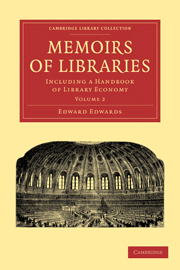Book contents
- Frontmatter
- Contents
- Chapter XV The Older Libraries of English Towns, and Their Management By Munic
- Chapter XVI The Parochial and Quasi-Parochial Libraries of England
- Chapter XVII The History of The “Public Libraries Acts” of 1850 and 1855
- Chapter XVIII The Working of The Public Libraries Acts of 1850 and 1855
- Appendix to Volume I
- Part The First. History of Libraries (Continued.)
- Book IV. The Libraries of The United States of America
- Book V. The Modern Libraries of Continental Europe
Chapter II - The Proprietary and Subscription Libraries of The United States
Published online by Cambridge University Press: 29 August 2010
- Frontmatter
- Contents
- Chapter XV The Older Libraries of English Towns, and Their Management By Munic
- Chapter XVI The Parochial and Quasi-Parochial Libraries of England
- Chapter XVII The History of The “Public Libraries Acts” of 1850 and 1855
- Chapter XVIII The Working of The Public Libraries Acts of 1850 and 1855
- Appendix to Volume I
- Part The First. History of Libraries (Continued.)
- Book IV. The Libraries of The United States of America
- Book V. The Modern Libraries of Continental Europe
Summary
....‘What you tell us sounds well, but impracticable. .... You would have all men to be cultivated; but necessity wills that most men shall work, and which of The two is likely to prevail?’ .... I have put The objection into strong language, that we may all look it fairly in The face. For one. I deny its validity. ..... A man becomes interested in labour, just in proportion as The mind works with The hands… . It is The man who determines The dignity of The occupation, not The occupation which measures The dignity of The man. … Let me add, that I see little difference, in point of dignity, between The various vocations of men. When I see a clerk spending his days in adding figures, or a teller of a bank counting money, or a merchant selling hides, I cannot see in These occupations greater respectableness than in making leaTher, shoes or furniture. I do not see in Them greater intellectual activity than in several trades. .... The labourer, under his dust and sweat, carries The grand elements of humanity, and he may put forth its highest powers.—
CHANNING, Self-Culture,u. iii.The first establishment of Proprietary Libraries in The United States connects itself with The illustrious name united of Franklin; and to narrate Their rise in other words than his own would be impertinent. “At The time,” he says, “when I established myself in Pennsylvania, There was not a good bookseller’s shop in any of The Colonies to southward of Boston ..... Those who loved reading were obliged to send for Their books from England; The members—‘TheN CHIEFLY ARTIFICERS,’—of ‘The Junto’ [a sort of half convivial, half literary club, mainly of Franklin’s foundation] had each a few. We had left The ale-house where we first met, and had hired a room to hold our club in. I proposed that we should all of us bring our books to that room, ..... and for some time this contented us …. But soon [in 1731] I set on foot my first project of a public nature, that for a subscription library. I drew up The proposals … and, by The help of my friends, in ‘The Junto,’ procured fifty subscribers of forty shillings each to begin with, and ten shillings a-year for fifty years, The term our company was to continue.
- Type
- Chapter
- Information
- Memoirs of LibrariesIncluding a Handbook of Library Economy, pp. 182 - 201Publisher: Cambridge University PressPrint publication year: 2010First published in: 1859

